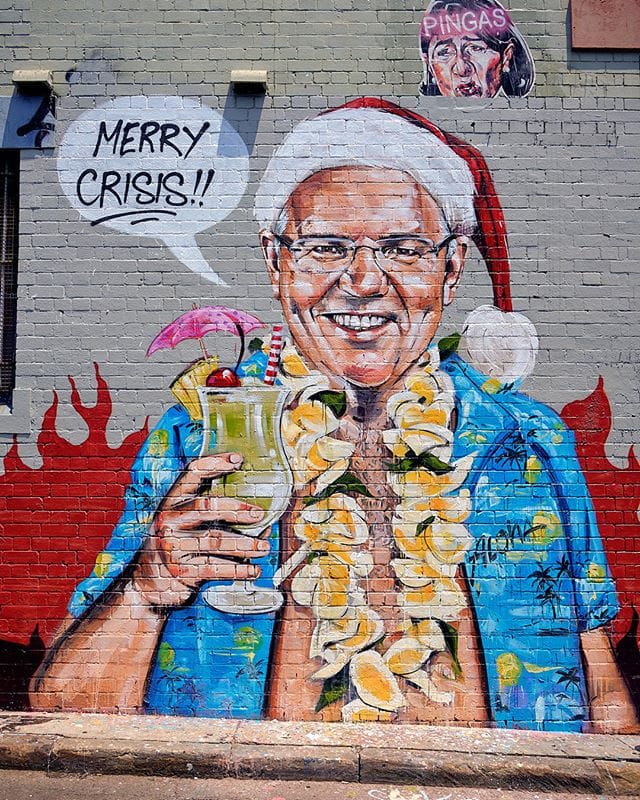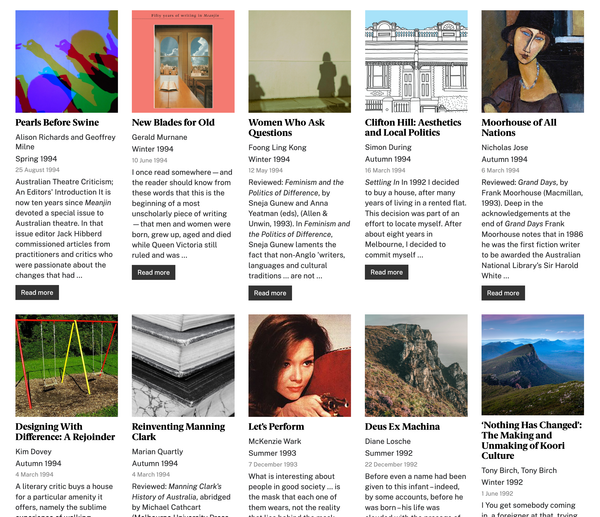Puff and Promotion
As if Scott Morrison cares about your criticism! and Everyone loves Miranda July

Crikey asked me to write about Scott Morrison’s not-really-a-memoir, Plans For Your Good, and of course I said yes. This was, I thought, an acceptable breach of the general principle that a critic shouldn’t agree to write about books that they know in advance they’re going to be compelled to shred. I said no to a commission earlier this year on the grounds that I thought the author was a bit of a twit, highly overrated, and I wouldn’t have been able to give their book a fair read.
Actually, for all that they are usually greeted with unwarranted rhetoric about courage, takedowns, in my moderate experience, are much easier to write than appreciations, and especially so if one is driven by a certain self-righteousness, a desire to correct not just the author, but the reading public who has glommed onto the work of a particular writer with such foolish enthusiasm. Such motivations do not always yield good criticism. This is why I tend to think takedowns should be approached with caution, and why there needs to be some proportional relationship between the degree of the burns and the profile of the author. Anyway, no such scruples were required in the case of writing about Scott Morrison, because there is no figure more public than a former prime minister and, as the peerless Patti Lupone once said of Donald Trump, I hate the motherfucker. Apologies for the vulgarity, but it’s true, and reading this book made it more true.
Another general principle of criticism went out the window writing about Plans For Your Good. With most memoir and autofiction, it’s usually not helpful or possible or desirable to use the life of the author as a benchmark for assessing the work. In the case of former prime ministers, that does not hold, and the misalignment of Morrison’s record in office with his self-presentation in Plans For Your Good is something to behold.
Reviews aren’t for authors, they’re for readers, but most authors give them at least passing attention. Does Scott Morrison care about literary criticism? No, he does not. He also, as has been well established, holds in contempt the humanities, the arts, universities, and pretty much every media worker who is not in the employ of Rupert Murdoch (and even a few of those lost souls). He hates us all! I don’t think I’ve ever written a piece about a subject so hostile to the institutions where critical thinking has a chance of circulating. Most authors hope for at least some positive responses to their book, but I honestly don’t think Morrison cares what any Australian readers make of his work. On his reckoning, anyone sufficiently invested in literature or history or politics to write about Plans for Your Good is probably primed to loathe it. To Morrison and his ilk, I’m just another secular, SJW hater. (Guilty as charged.)
The piece is live and you can read it here. I wrote much more than the eds asked for and they were kind enough to publish it in full without any chops. Thank you, Crikey eds! It was a kind of vomitous vindication to see reported this week Morrison’s visit to Manhattan to schmooze Trump. There is nothing this man won’t do in pursuit of self-aggrandisement.

The caption is typical shameless self-promotion: ‘It was nice to catch up again’; ‘These were issues we discussed regularly when we were both in office’; ‘our friend, Shinzo Abe’. The book was riddled with such asides, which makes me think it wasn’t ghostwritten.
Of course I had a lot more to say, especially about the form of the political memoir. Two characteristics of recent prime ministerial memoirs: they are long and they are earnest. Morrison’s predecessors took their contribution to the historical record seriously. It’s easy to mock Gillard, Rudd and Turnbull for the exacting detail of their memoirs, and to read into the detail their anxieties about posterity, especially on the proprieties of leadership spills. This is, however, entirely appropriate. Prime ministers should take the office seriously while they’re in the job, and writing a memoir, no matter how rambly and partisan it is, is part of that job.
Morrison’s book has a lot more in common with the book-as-political-job-application. Battlelines by Tony Abbott (2009) and Hearts and Minds (2013) by Chris Bowen are two local examples that spring to mind but this is a genre that is much more common in the US. It is practically compulsory for American politicians to write a book-length statement of principles if they’re seeking higher office. Recall the Republican primaries? It generated many desultory examples of the book-as-job-application: Nikki Halley, If You Want Something Done (2022), Ron de Santis, The Courage to Be Free (2023), Vivek Ramaswamy, Nation of Victims (2022) and Capitalist Punishment (2023). There are more – Chris Christie, for example, is a prolific author – but I think the point has been made. The apex predator of this category is Trump: The Art of the Deal (1987). I haven’t read it, but I did skim this extract. Approach with caution.
And as his tweet this week shows, Morrison is absolutely scouting for work in the US and he’s still hedging his bets. Mike Pence wrote the introduction to his book and there are a few very conspicuous lines in Plans for Your Good about respecting the will of the voters in democratic elections. And yet there’s Morrison in league with the other band of Republicans, the election-deniers, flaunting his shimmering photo opportunity with Trump, commiserating about the pile-on. Anyway, if anyone calls me to ask for a reference for Scott Morrison, I’ll point them to my Crikey piece.
Final comments (really). In my piece I quoted James Ley’s 2022 essay/one-man riot on Morrison, which was published on the SRB the week before the election that saw Morrison voted out. If you haven’t read it, you should. Having read Plans For Your Good, I can confirm that this assessment remains as true as it did in 2022:
Morrison’s political career provides no grounds for believing that he will ever give a straight answer to any question, offer a cogent and consistent argument, explain himself in any way, or do anything he says he will do. He has never baulked at any hypocrisy, small or large. He speaks in order to make the very act of questioning him an exercise in futility, addressing no concrete reality beyond the immediate imperative to generate static. It is a form of anti-oratory: the rhetorical equivalent of avoiding an awkward conversation by starting up a leaf blower.
Ley’s essay has aged well. You know what hasn’t? The 2015 episode of Kitchen Cabinet featuring Scott Morrison when he was Minister for Social Services, also known as the minister responsible for robodebt. I couldn’t get through it. Morrison was extremely adept at dodging accountability and still is. As you watch Annabel Crabbe giggle and softball her way around Morrison’s disgraceful, cruel record as minister for immigration, it’s newly apparent that this inane ‘getting to know you’ journalism was 100% in line with the marketing strategy that Morrison stuck to throughout his career, and that served him so well.
I still haven’t managed to read All Fours by Miranda July; I may do so this weekend. I’ve been staggered by the coverage of this new novel, the sheer volume of it, for starters, and how much of it reads like regurgitated press releases. The marketing team must be ecstatic. I’m a keen observer of hype, but the activity around All Fours has been something else. As a forty-something writer with kids, even one who has recently spent a lot of time playing Scott Morrison’s greatest hits online, I am in the hype target zone, and whoa, am I ready for a break. It’s Crabbe on Morrison powderpuff territory. The conditions are ripe for a takedown. So far, only Jessa Crispin has risen to the occasion in a review that likens the book to ‘an extended advertisement for an all-inclusive health spa’.
All Fours has had the fortune of being published into a media cycle that aligns very nicely with July’s dare-we-speak-of-these themes. Polyamory, marriage (is it in crisis?), tradwives and perimenopause (it exists!): where would the middlebrow American media be without them in 2024? When I say there’s not much criticality at work in the reception of All Fours, I don’t mean I’m gunning for more takedowns, I mean that I see very little effort to contextualise the novel and the questions it appears to be asking. The New York Times has provided a helpful headline that encapsulates the framing of the novel: wait for it, the ‘first great perimenopausal novel’. Pass me the smelling salts… As is often the case with splashy memoirs and works of autofiction, the coverage is much more interested in July than in her writing. As ever, the celebritisation of women authors, as with the celebritisation of writers of colour, draws attention from the work to the gaudy life. The coverage also seems to imply that only writers who share some of July’s experiences, who can relate to what she’s writing about, will be drawn to the book, thereby diminishing not only the work of a woman writer, but women readers as well.
Obviously there’s been a breathless discovery of the menopause in media circles over the last five years, following in the footsteps of those business owners now churning out stuff to sell to perimenopausal millennials. Although medical research on menopause, like so many other aspects of women’s health, is reportedly lacking, we want no longer either for feature journalism or consumer goods. But you know who has been paying attention to women and their complex mid-life experiences since forever? Novelists! Women novelists! Feminist novelists! – who have been writing about the marriages, domestic arrangements, creative ambitions, sexuality, mortality of women in their forties, fifties and sixties for all of the twentieth century and indeed much longer. These are not new themes and it is a nonsense, even in this deranged attention economy, to suggest that they are! Miranda July is a weird, highly original artist. This idea, though, that she might be the first to write about the intersecting crises of marriage, motherhood, creativity and sexuality is utterly galling. I realise coverage of this ilk is as much about driving traffic to whatever publication as it is about selling books but it does no one, not even Miranda July, any favours to suggest that a new novel about a domestic crisis is sui generis.
What do we lose when we erase existing lineages of women’s art and writing in this way, when we designate a ‘first great perimenopausal novel’ without acknowledging mountains of underrated domestic crisis novels and artists-as-mothers novels? You don’t even have to look far back – Elena Ferrante, Annie Ernaux and Constance Debré are hardly obscure to the present moment. Can we blame TERFs for so tarnishing the legacy of Women’s Lib that it simply can not be mentioned? These are some of the questions I will be taking to All Fours, when I finally get to reading it. And why is all this crisis-in-marriage bizzo across the media so fixated on the experiences of middle-class white straight women – and so reluctant to acknowledge their limited range of inquiry?
This episode in book publicity has been provoking as I’ve been mulling over what a feminist critical practice can look like in this day and age. No answers to that right now, but I welcomed the perspective of Moira Donegan on feminist practice and what it might mean to call yourself a feminist - Not the Fun Kind, as the excellent title of her newsletter would have it - in 2024. This is a lot to write about a book that I haven’t read, and I suppose I had better do so before I write any more (once I’ve stumbled over the baskets of unsorted laundry and wept into my kombucha and darned the shroud of my youth and googled intentional parenting etc etc).
Thanks for reading Infra Dig! Subscribe for free to receive new posts and support my work.


